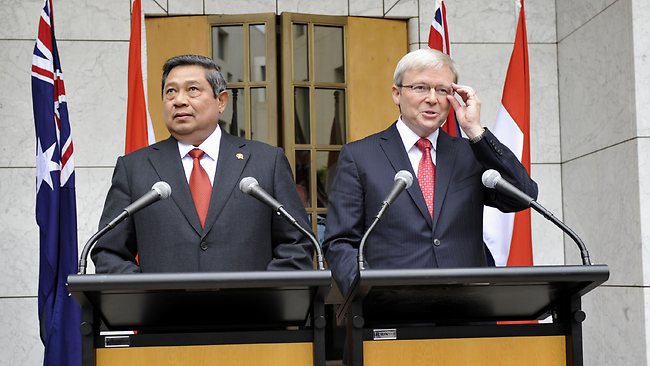Photo: AP
The extent of public engagement with Australia’s place in the 21st century has ramped up dramatically over the past 12 months.
There is a growing awareness and recognition that the relatively stable geopolitical and economic dynamics that shaped Australia’s place in global society since the Second World War are now rapidly changing. This paradigm shift is encapsulated broadly in the phrase the “Asian Century” which recognises that the political, economic and cultural and security dynamics of the 21st century will increasingly be shaped by the emerging economies of the Asia Pacific region.
With more and more policy statements and column inches devoted to discussions around Australia should interact with its emerging neighbours in Asia, private, public and civil society organisations all have a role to play in representing the interests of their members to the decision makers who ultimately will steer the state of our relations.
Over the past 12 months, the Australia-Indonesia Youth Association, or AIYA, has been an active participant in the Australian Government’s public consultations on how to position Australia in the ‘Asian Century’, and how our relationships – especially with Indonesia – should be managed.
This process began 12 months ago, when the federal government called for public submissions to its Australia in the Asian Century white paper. AIYA’s submission was drafted by a team of three, including AIYA’s Executive Director Arjuna Dibley, Director of Partnerships Fe Donahue, and AIYA member Nicholas Parsons, with help from Rachelle Cole, AIYA’s Director of Operations. It contained insights from a survey conducted amongst AIYA’s audience addressing the challenges involved in engaging with the region.
The final can be downloaded from the AIYA website.
The submission represented AIYA’s members in two main areas:
- Improving physical access for Australians seeking to enter and remain in Indonesia for the purposes of education, training and working holidays
- Seeking greater financial support for young Australians pursuing study or internship opportunities in Indonesia.
Although these might seem like relatively obvious ways of improving Australia’s bilateral engagement with Indonesia, AIYA’s submission was important in that it represented the growing number of university students and early career professionals seeking a long term career related to this important relationship.
What did this submission achieve?
For starters, it led to strong media coverage regarding problems that Australians face accessing the Indonesian Work and Holiday Visa. AIYA’s proprietary member research provided unique and timely insight to existing challenges with obtaining this visa, which allowed the issue to be successfully raised in the press.
Beyond this, the release of the Australia in the Asian Century White Paper coincided with some small but significant policy items. One of these was an increase to the maximum loan size under the OS-HELP scheme for undergraduate students pursuing tertiary study in Asia.
The Government is assisting Australian university students wanting to study in Asia through its Higher Education Support Amendment (Asian Century) Bill 2013. From 2014, the legislation will provide greater financial assistance through the OS-HELP scheme for students wanting to undertake part of their study in Asia. Under this legislation, the maximum loan available for students undertaking study in Asia will be increased from $1,250 to $7,500.1
The government also announced its support for Indonesian language teaching, identifying Indonesian as one of four ‘priority languages’ to be offered from primary school through to university.
Can AIYA claim all the credit for these wins? Not entirely – policy outcomes are ultimately shaped by many hands and many heads. But without a doubt our engagement in the process adds the voice of our members to the end product.
It is our hope that the CAUSINDY conference along with our annual members’ survey, will become the cornerstones and ‘intellectual engine room’ for AIYA’s contributions to the discourse on Australia-Indonesia relations in the years ahead.
Stay tuned for part 2, in which we describe our follow-up response to white paper, and contributions to the development of and Indonesia Country Strategy…



















